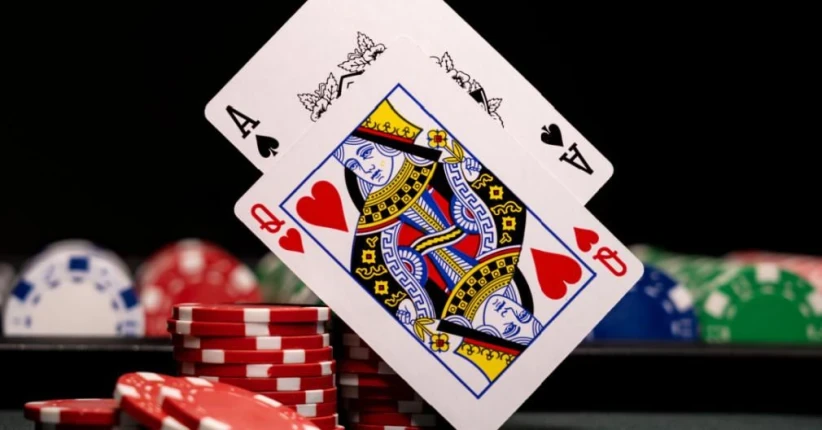A Cat-and-Mouse Game: The Evolution of Card Counting

For centuries, gamblers have been using various strategies to gain an edge. The desire to beat the odds has remained despite an influx of new games at casinos worldwide. Blackjack, one of the most popular card games at online and brick-and-mortar casinos, has players deploying various tactics to win.
A popular, and controversial one, is card counting, which had pivotal roles in such movies as "Rain Man" and "21." But it's not as easy as it may seem in films. "It's a tough way to make an easy dollar," Josh Axelrad, former professional card counter and author of "Repeat Until Rich," told Atlas Obscura.
The strategy of card counting is not exclusive to blackjack and can be used when playing a variety of card games, including poker and baccarat. Because blackjack is played with cards face up, the game is a top choice for card-counting gamblers trying to maximize their profits.
Blackjack also has one of the lowest house edges among casino games, according to Wizard of Odds. The house edge, which measures the average gross profit a casino could make from each game, is only 0.28% for blackjack played with liberal Vegas rules.
In comparison, roulette played with a single zero and Ultimate Texas Hold 'em gives the house nearly 10 times the edge at 2.7% and 2.19%, respectively. No wonder it's a prime candidate for adept card counters.
Blackjack has a long, storied history stretching back to 15th-century Europe, when it was called "vingt-et-un," or 21. How it came to North America remains unclear; one theory suggests it was brought over by the French when they settled in New Orleans. The game spread from there, spurred by the legalization of gambling houses in 1823.
As with any game, everybody wants to win, so players seek the best techniques for success. The desire gave birth to card counting, popularized by American mathematician Edward O. Thorp's 1962 book "Beat the Dealer," which remains in print, inspiring professionals and amateurs alike to consider gambling mathematically.
In turn, Thorp became both famous and infamous, even skirting some violence and drugging incidents, which just goes to show how far people go to win.
We looked at the history of card counting and the modern techniques casinos use to combat it.
How It Works
Card counting requires players to determine their odds of winning by keeping track of the value of cards that have been dealt. Players looking to card count when playing blackjack can use several strategies to improve their chances of winning. The most common method, Hi-Lo card counting, requires players to evaluate each card dealt in blackjack.
Using the Hi-Lo strategy, a player assigns a value from -1 to +1 to each card dealt. As a game progresses, a player must keep a running count of the value of those cards. A player then places wagers based on the value of the running count, known as the "true count." If the result is a favorable true count determined by a player, then larger wagers can be considered.
The Hi-Lo method became famous following its development by computer scientist Harvey Dubner in 1960. Dubner, using an IBM computer, simulated games of blackjack. The games allowed Dubner to develop the Hi-Lo method, solving for the optimum bet.
He shared his findings at the 1963 Fall Joint Computer Conference in Las Vegas in a session moderated by Edward O. Thorp, who published his book the year before. The debut of Dubner's method caught like wildfire, and Dubner's method "stole the show," according to author Jerry Patterson.
"The room filled up and overflowed 45 minutes before the session was scheduled to start!" Patterson described. "Hundreds of conference attendees were pushing and shoving to get into the room." Thorp then incorporated Dubner's simpler system into his 1966 edition of "Beat the Dealer," where it continues to influence generations of gamblers.
Casinos Take a Stand
As the popularity of card counting grew, casino floors worldwide began to take notice. Though no law in any jurisdiction in the United States explicitly bans card counting, casinos have taken steps to identify and discourage its practice.
Casinos are private properties, which allows them to deal with the situation as they see fit. Many casinos start with soft tactics. One way to prevent card counting is changing the dealer at a table. Switching a dealer can cause card counters issues due to the changed pace of play. A new dealer may also be forewarned and could intentionally deal faster or slower than usual in an effort to disrupt a card counter.
Casinos may also force reshuffling of decks, which requires a player to completely restart the card-counting strategy they are using.
Casinos could even raise the table minimum bet at a blackjack table to unsettle a player who is card counting. The increase in bet pricing may be too high for a card counter, who is psychologically used to a certain bet range.
Some take a different approach and entice a player with benefits. Casinos have been known to comp card counters, offering them free meals or accommodations, just to get them away from the table. In this instance, players who are card counting take the hint and cash out with a profit, plus extra benefits offered by the casino.
Tougher approaches include security cameras and casino personnel to pick out card counters. Security camera operators are often trained to identify suspicious activity, including players who seem to be counting cards. Casinos have also hired former card counters to identify players and teams using the tactic.
On top of these "eyes in the sky," casinos have created Be On The Look Out lists for individuals suspected of or caught card counting. The lists, which can include aliases, are sometimes shared between casinos through agreements. Combined with facial recognition software, card counters are spotted even before they make it to a table. Personnel can be sent down to walk a suspected counter out of the casino.
If these methods fail, some casinos will call in law enforcement on the grounds of fraud or cheating to stop a player who has been card counting despite it not being illegal. It is considered a last-ditch effort and could lead to large fines for card counters.
However, it seems there will never be a true winner between the casino and card counters. Because of its simplicity and relatively high chances of winning compared to other casino games, blackjack will continue to thrive as a leading casino game for both online and retail gambling operators. Its popularity and availability at casino floors also means players will continue finding every edge they can get, including employing card counting.
Online casinos can effectively curb card counting by using random number generators, which make a dealt hand completely random, but in the physical world, where the excitement and the atmosphere of gambling truly come to life, the battle of the wits between casinos and gamblers wages on.
To help players get started and make them feel they get off on the right foot, operators give online casino promotions to these players, which at times includes free money. Though this doesn’t totally make up for going up against a random number generator, it certainly helps.
Online Casinos Nullify Card Counting
As already noted, land-based casinos took a stand and with the rise of real money online casinos and sweepstakes casinos in the US, there is even less of a chance to card count.
Random number generators and the ability to not know how many cards are in the "shoe" make card counting almost impossible online. But gambling should always be about entertainment to temper expectations of striking it big.
If you do want to play blackjack and other table games, sites like Chumba Casino have plenty of games to choose from.
Story editing by Carren Jao. Copy editing by Paris Close.
/author-profile-picture/justin-byers.webp?v=1692855821)

Justin covers in-depth athlete analysis for OddsSeeker ensuring our picks for heroes & losers are a lock! Byers previously worked at Front Office Sports as a Business Writer after his time at FanSided covering the NBA. He received his B.A. in political science from Emmanuel College and M.A. in sports journalism from Indiana University-Purdue University of Indianapolis.
More about Justin ByersRelated Stories
Get over $1,000 in casino bonuses



